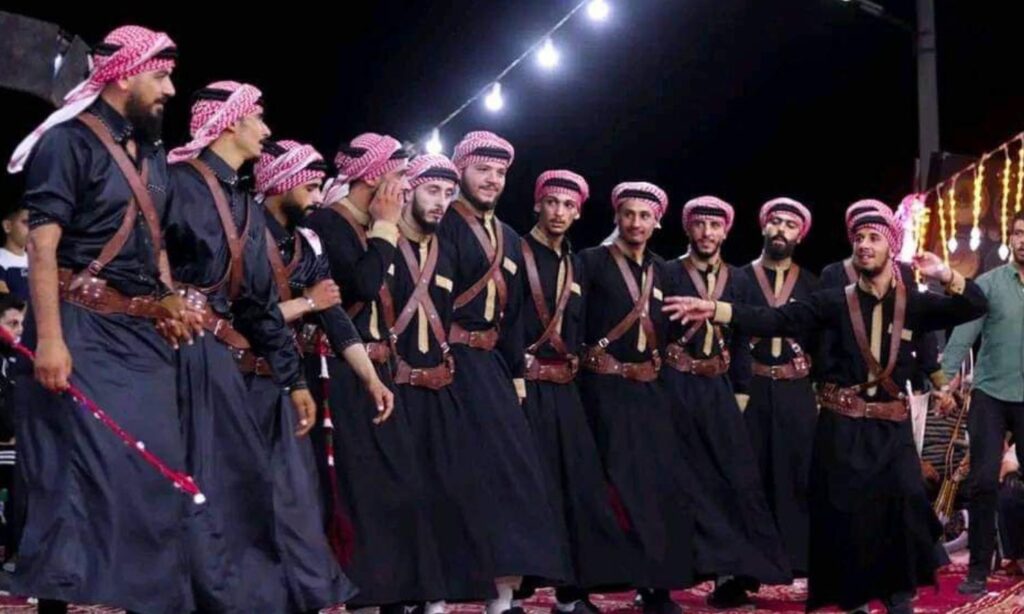Daraa – Halim Muhammad
Traditionally, customs and traditions in the Daraa province in southern Syria include serving feasts on wedding days. Guests are typically offered “mansaf” made from the famous dish “mlehy,” which consists of cooked and mashed bulgur with “kathi” broth (dried balls made from dairy derivatives), topped with broth, “kebab” (kibbeh), lamb pieces, and Arab ghee, or trays of rice with meat, which some villages call “ouzi.”
A large segment of residents has moved away from these customs due to the weakened purchasing power of the inhabitants and the high costs of meat and food components. However, a small percentage of well-off individuals and shepherds still adhere to these traditions.
Some residents have replaced feasts with packed sweets distributed to guests on the wedding day.
Wrapped sweets
Mahmoud, 30, was unable to provide a lunch meal for the guests at his brother’s wedding in Tafas, prompting him to offer sweets instead, which are more affordable compared to meat feasts.
Mahmoud explained that providing a food banquet would cost him at least 50 million Syrian pounds (about $3,350), an amount his family does not have. Therefore, he opted to buy sweets, pack them in cardboard boxes, and serve them to the guests during the wedding.
Mahmoud added that he bought each box of sweets for 8,000 Syrian pounds ($0.55) and needed 500 boxes, costing him a total of 4 million pounds.
His family wasn’t used to serving only sweets at weddings, but their farming work and the decline in production had weakened their financial capabilities.
The price of sweets varies based on the quality, with prices reaching up to 35,000 Syrian pounds (about $2) per box in some upscale stores, while popular varieties range between 7,000 and 10,000 pounds.
Ismail, 35, from eastern rural Daraa, considered that traditions have changed due to the weakened purchasing power and high livestock prices.
The young man, who served sweets at his wedding, noted that feasts are now limited to well-off individuals and those who own livestock.
He said that wedding invitations were previously open to the public, whereas now the groom limits invitations to close relatives to match the budget.
The family of Mohammed al-Mufa’lani, residing in Nahteh in eastern rural Daraa, adhered to providing feasts for guests at his brother’s wedding.
Despite the high costs, the groom’s relatives, supported by their expatriate relatives, insisted on continuing this beloved social custom, as they mentioned.
They slaughtered 15 sheep for his brother’s wedding, and the invitation was extended to the entire village.
High costs
The price of a kilogram of meat before slaughter reached 60,000 Syrian pounds ($4), with a slaughtered animal weighing 50 kilograms costing up to 3 million pounds.
Although the meat price has dropped from 80,000 Syrian pounds per kilogram before slaughter in June to 60,000 pounds currently, it remains out of reach for most residents.
Syria owns 18.8 million sheep, representing 1.27% of the global sheep population, according to the government Tishreen newspaper.
Daraa’s Director of Agriculture, Bassam al-Hashish, estimated the sheep population in Daraa at 817,407, with 12,705 breeders across the province.
Al-Hashish noted that the livestock situation is good in terms of flock growth and disease absence.
Wedding feast costs aren’t limited to meat but also include high-quality rice, reaping no less than 35,000 Syrian pounds per kilogram.
Additionally, good quality ghee, nuts, spices, and gas costs also contribute. Gas cylinders cost 350,000 Syrian pounds ($23.6) in the black market, and preparing a wedding feast requires at least two cylinders.

